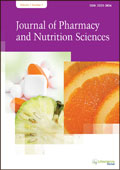jpans
|
|
Abstract: During the conducted research, it is established that aluminium chloride intoxication leads to the considerable changes of composition of red blood, development of a hypercalcemia and change of a bone structure of animals. A number of significant morphofunctional changes in the hippocampus of the examined animals are also noted. The use of the tissue preparation "Nicavet-1000" leads to the normalization of both hematocrit and other parameters of red blood, as well as to the intensification of erythropoiesis. Use of the preparation "Nicavet-1000", judging from the results of research, prevents pathological changes in a bone tissue, caused by aluminium chloride. "Nicavet-1000" leads to the expressed normalization of both the morphological, and micromorphometric parameters characterizing a hippocampus of rats. Keywords: Aluminium, intoxication, hippocampus, bone tissue, tissue preparation. |
|
|
Abstract: We here investigated the inhibitory effect of Brazilian propolis on intracellular lipid accumulation. Seven ethanolic extracts of Brazilian propolis were tested for their inhibitory effect on intracellular lipid accumulation in 3T3-L1 cells. Among the seven Brazilian propolis, the extracts AF-08 and AF-18 had inhibitory effects on intracellular lipid accumulation. In particular, the Brazilian propolis AF-08 exhibited a potential inhibitory effect on intracellular lipid accumulation.Thus, these results suggest that the Brazilian propolis AF-08 contributes to the prevention of metabolic syndrome. In addition, five known triterpenoids were isolated from the Brazilian propolis AF-08: betulonic acid, moronic acid, 3-oxo oleanolic acid, masticadienonic acid, and anwnweizonic acid. Four of the triterpenoids exhibited an inhibitory effect on intracellular lipid accumulation. Thus, these triterpenoids may be important as antiobesity agents that inhibit the metabolic syndrome. Keywords: Brazilian propolis, 3T3-L1 cells, lipid accumulation, triterpenoids.Download Full Article |
|
|
Abstract: Cancer prevention offers the most cost-effective long-term health strategy. The methanol extract of the leaves of guava(Psidium guajava) exhibits marked antitumor activity in an in vivo two-stage carcinogenesis test in mice using 7,12-dimethylbenz[a]anthracene (DMBA) as an initiator and 12-O-tetradecanoylphorbol-13- acetate (TPA) as a promoter. From the active fraction of the methanol extract, five triterpene acids, uvaol (1), ursolic acid (2), corosolic acid (3), asiatic aci (4), and oleanolic acid d (5), were isolated and identified. These compounds were evaluated for their inhibitory effects on TPA-induced inflammation (1 µg/ear) in mice, and showed marked anti-inflammatory effects, with a 50% inhibitory dose of 117–657 nmol/ear. The leaves of guava may therefore be effective for cancer prevention.. Keywords: Guava, Psidium guajava, antitumor promotion, anti-inflammation, cancer prevention. Download Full Article |
|
|
Abstract: The methanol extract of chaga (sclerotia of Inonotus obliquus) inhibited the promoting effect of 12-O-tetradecanoylphorbol-13-acatate (TPA) applied twice weekly on skin tumor formation in mice initiated with 7,12-dimethylbenz [a] anthracene. The methanol extract from chaga led to the isolation of eight triterpenoids (1-8). The anti-inflammatory activity of the isolated lanostane-type triterpenes was evaluated against TPA-induced inflammatory ear edema in mice. These compounds showed markedly anti-inflammatory effects, with a 50% inhibitory dose of 125-458 nmol/ear. Keywords: Chaga, Inonotus obliquus, lanostane-type triterpene, antitumor promotion, anti-inflammation, two-stage carcinogenesis.Download Full Article |
|
|
Abstract: Cancer prevention by supplements offers the most cost-effective long-term health strategy. Methanol extracts from the aerial parts of Epimedium koreanum were previously found to inhibit 12-O-tetradecanoylphorbol-13-acetate (TPA)-induced inflammatory ear oedema and tumour promotion by TPA in the two-stage mouse skin carcinogenesis model. Four prenyl flavonol glycosides (1‒4) were isolated from the active fraction of this extract, and were identified. The isolated compounds showed inhibitory activity against TPA-induced ear inflammatory ear oedema. The 50% inhibitory dose (ID50) of icariin (1), epimedin A (2), epimedin B (3) and epimedin C (4) for TPA-induced inflammation ranged from 114 to 255 nmol/ear, suggesting greater potency than indomethacin (ID50: 908 nmol/ear), an anti-inflammatory drug. Thus, the epimedium herb may be useful in cancer prevention. Keywords: Cancer chemoprevention, antitumour-promoting activity, two-stage carcinogenesis, prenyl flavonol glycosides, Epimedium koreanum. Download Full Article |



